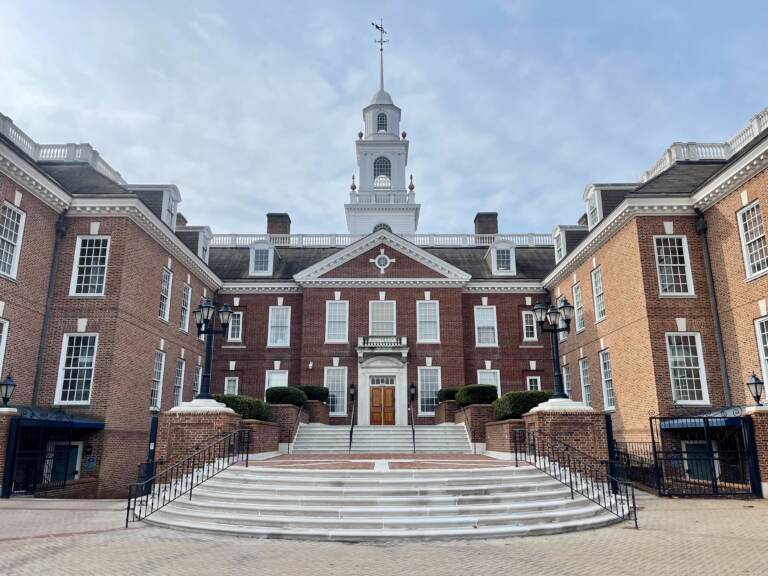Bill to add more school resource officers in Delaware stalls in House committee
The sponsor said he wants to revive the bill later this year to provide funding for officers in all Delaware schools.

Legislative Hall in Dover, Delaware. (Johnny Perez-Gonzalez/WHYY)
From Philly and the Pa. suburbs to South Jersey and Delaware, what would you like WHYY News to cover? Let us know!
This story was supported by a statehouse coverage grant from the Corporation for Public Broadcasting.
Legislation that would fund school resource officers in all of Delaware schools and charter schools appeared to die in committee after failing to muster the number of required votes to move forward. But bill sponsor, Rep. Bryan Shupe, R-Milford, says he plans to revive the legislation later in the session.
Shupe said the bill would give annual funding to any school that would want to employ an SRO or constable in their school. The state would pay 70% and the local share would be 30%. Schools would be able to opt out, but could not then use the funding for other types of positions. One SRO position can cost around $100,000, he said.
“SROs really have two major roles,” Shupe said. “The first role is to ensure that their school is safe and the second thing that they do is creating an environment in the school that helps with the community when it comes to bridging the community and law enforcement.”
A school resource officer is a law enforcement officer with arrest powers who works in a school environment. A key difference between an SRO and a police officer is that an SRO receives special training in dealing with youths.
Democratic members of the House Education Committee raised concerns with the cost of the bill, the possibility that more law enforcement personnel in schools could lead to more students becoming involved in the criminal justice center and whether SROs will aid immigration officials in arresting undocumented people.
Center for Safe Schools Director Joey Melvin said the increase in school resource officers over the past 25 years has paralleled two positive trends nationally; a drop in juvenile arrests and an increase in graduation rates. However, he admitted there was no evidence supporting a claim that SROs in schools led to those results.
“One of my fundamental questions about this approach to education is that you have things like a fist fight, which used to be like a normal part of childhood, [is] now assault,” said Rep. Claire Synder-Hall, D-Rehoboth Beach. “You’re arresting children for doing things that are part of the growing up process. I mean, hopefully not. I never got into a fist fight, but turning childhood misbehavior into a crime, I think, is a problem.”
Melvin said the Delaware juvenile civil citation program was one way SROs prevent youth from entering the criminal justice system by not making an arrest. It’s a diversion program that requires youth to complete community based services to avoid a criminal record.
Rep. Sean Lynn, D-Dover, said he was concerned about civil rights of students who he argued would be subject to more law enforcement surveillance by additional SROs in schools. He also said he was worried about SROs aiding immigration officials in rounding up undocumented people at schools for possible deportation.
“Are we going to suddenly now see parents not willing to send their kids to schools because schools are now open for business for immigration officers?” he asked. “And will Delaware SROs now be part of that, those operations which I would take issue with?”
After taking office last month, President Donald Trump removed a provision that restricted immigration activities from sensitive areas like schools and churches. Delaware’s Education Secretary Cindy Marten has released guidance for families and educators to address concerns about possible immigration action in schools.
House Education Committee Chair Kim Williams said SROs are there to only address serious threats inside schools. But she questioned the price tag of the bill, which starts at $42.8 million for fiscal year 2026 and then costs around $33 million for the next two fiscal years.
Some Democrats also raised the issue of constables accidentally discharging their weapons in schools and asked if any additional training would be required as a result of these incidents.
Rep. Nnamdi Chukwuocha, D-Wilmington, said there’s a need for more professionals like mental health workers, although Shupe said money for that was just approved last year.
“As a professional social worker, I can tell you that there are many of those units that are vacant and or haven’t been filled,” Chukwuocha said. “If there was a way to address the flexibility to where schools had that option or if there were other uses that the funding could be used for, I would be more inclined to support.”
Shupe said he plans to focus on trying to lower the price tag of the bill and try to convince other Democrats on the committee that the officers make a positive impact on schools so he can get the bill released for a floor vote.
State lawmakers have the next several weeks off while the Joint Finance Committee hears budget requests this month.

Get daily updates from WHYY News!
WHYY is your source for fact-based, in-depth journalism and information. As a nonprofit organization, we rely on financial support from readers like you. Please give today.







